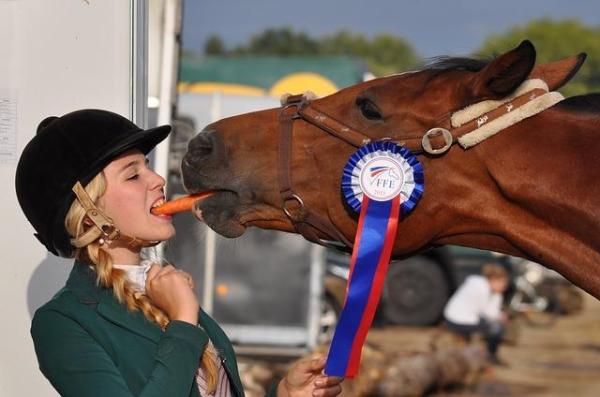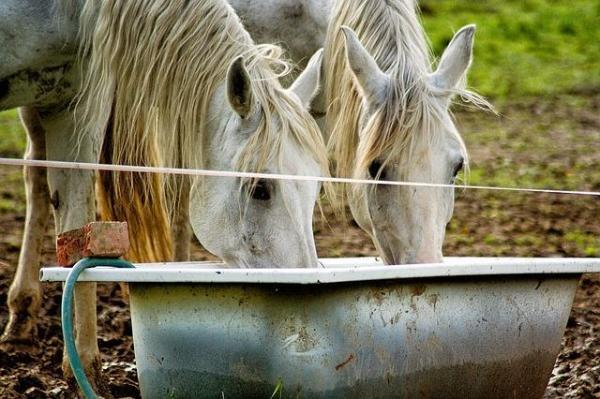What is the Best Diet for Horses?



See files for Horses
Horses are just like dogs, only bigger. Over the centuries, they have formed a very special connection with humans. Many people keep horses as companion animals instead of a dog or a cat, and they develop very strong bonds with them. However, horses are more challenging and demanding than smaller pets as far as care and maintenance are concerned.
Giving a horse the correct diet is key in making sure it stays healthy; if its diet is inadequate, its quality of life would deteriorate and it could easily become ill. Before learning what kind of food you should give your horse and how to give it, it is important to know all about the horse in particular, such as its breed, age, health or physical activity.
A horse grazing quietly all day will not have the same diet as a race horse. In this regard, we recommend that you go and see your veterinarian. Meanwhile, this AnimalWised article will explain in general terms what is the best diet for horses.
Horses eat their greens - and lots of them.
For thousands of years, the diet of the horse has been based on grass. Horses are herbivores who feed on almost everything that the environment provides naturally. Grass contains almost all the nutrients they need, especially fiber. Horses have a very delicate digestive system, and if you leave them be they'll eat all day, but always in small quantities. The pasture where the horse spends its time must be abundant, green and of good quality.
Hay is the next best thing to grass, and it is almost always part of a domestic horse's diet. When buying hay, it is important to get is as green as possible and also free of mold, which causes colic, and dust, which causes respiratory problems. Good quality hay will contain a greater quantity of nutrients. For example, alfalfa hay has a high quantity of protein, higher than that of grass.
Grains are also part of a horse's diet, but only in small quantities. Their favorite grain is oats, but you can also give them corn. Forbidden grains include wheat and those typically eaten by humans such as kidney beans, white beans and lentils. These types of grain can lead to ulcers and dental problems.

Pampering your horse with treats
In addition to grass and hay, there are food pellets which contain ingredients such as flaxseed, vitamins, grains, treacle - for energy and flavoring - and even beet pulp. Some call them multivitamins for horses as they help balance out any deficits in their diet and provide extra energy. There are blends which include salt and minerals, recommended to help satisfy your horse's cravings.
It is important to pamper your horse, as this will make it happier and more active. Treats and other goodies are good, provided that they are given in the appropriate quantities and not too often. Horses really enjoy fruit such as apples and peaches. They also enjoy vegetables like carrots and even boiled eggs.

Water, a staple of any diet
Horses need to drink abundant fresh water. Horses can drink up to 15 gallons of water a day, and it should always be fresh, cool (not freezing) and clean. If possible - even if you are not present - allow your horse to have access to water at all times. If this is difficult, make sure they drink water at least 3 times a day and give them time to drink plenty of it.

What foods are bad for horses?
- Horses are herbivorous animals so you should never give them meat. It could destabilize their body and affect their intestinal flora.
- Overfeeding a horse can have the opposite effect and cause stomach problems or obesity. Calculate their total daily needs. Horses normally eat 1.5 to 3% of their body weight, with an average of 2.5% each day. Do not give your horse treats all the time. They will be healthier and more special if they are not given in excess.
- Be careful when you give them grass clippings, because they may contain poisonous plants.
- It is best to avoid foods such as broccoli, tomatoes, potatoes and cauliflower. They can cause flatulence if given in large quantities, and horses do not tolerate it well.
- Bread or any kind of pastry are strongly contraindicated because they can become a doughy mass and cause blockages in the digestive tract.
- Avoid feeding your horse just before or just after intense physical activity at all costs. In their feeding schedule, allow your horse at least an hour to digest its food. The digestion process is essential for maintaining a good state of health. If the activity is strenuous, allow a leeway of up to three hours before or after.

Perhaps you are also interested in...
If you want to read similar articles to What is the Best Diet for Horses?, we recommend you visit our Healthy diets category.









